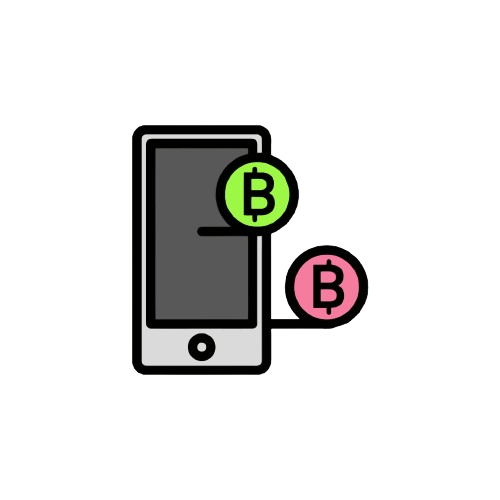
For many crypto users, mobile wallets are the easiest way to manage Bitcoin. They’re fast, convenient, and always in your pocket. But with that convenience comes risk, and in recent years, hackers have found new and creative ways to exploit it.
As more people store Bitcoin on mobile devices, it’s important to understand the hidden vulnerabilities that could turn a smartphone into a hacker’s favorite target.
When Your Phone Becomes a Target
While mobile wallets can have risks, using a secure non-custodial wallet can make managing Bitcoin both safe and convenient. Platforms like Bitamp allow users to generate and access wallets directly in their browser without sharing personal data or private keys online. When used offline, Bitamp can function as a cold wallet, offering enhanced security while still providing the flexibility to send and receive Bitcoin when connected. Using trusted, privacy-focused wallets helps reduce common risks while maintaining full control over your funds.
When Cheap Phones Come Pre-Loaded with Malware
In the hunt for affordability, many users turn to budget smartphones, but some of these come with hidden dangers. There have been increasing reports of low-cost devices pre-installed with malicious software designed to steal cryptocurrency.
These apps often disguise themselves as system updates or helpful tools, but once active, they can intercept copied wallet addresses or send private data to remote servers. If you’re serious about Bitcoin security, investing in a reputable device is a must. Cheap hardware can sometimes come with an expensive lesson.
AI-Powered Phishing That Looks Too Real
Phishing scams used to be easy to spot, with poorly written emails or suspicious links. Today, they’re powered by artificial intelligence, making them far more convincing.
Attackers can now generate professional messages, clone websites, and even use deepfake audio to impersonate known support agents or friends. Some scams go as far as altering a single character in a wallet address, tricking users into sending funds to the wrong destination.
The best defense is old-fashioned caution. Always double-check URLs, avoid clicking unknown links, and never share private keys or seed phrases, even with someone claiming to offer help.
The Dangers of Public Wi-Fi

Public Wi-Fi may be convenient, but it’s a goldmine for attackers. Hackers can intercept connections, capture passwords, and monitor transactions made on open networks.
If you’ve ever checked your crypto wallet balance or made a transaction over public Wi-Fi, you could unknowingly expose your sensitive data. Using a secure, private connection is always safer. Better yet, wait until you’re on a trusted network before opening your wallet app.
The Hidden Vulnerability in Randomness
Even the most trusted apps can have weaknesses. Some mobile wallets rely on software-based random number generators to create private keys. If that randomness isn’t truly random, hackers can predict wallet keys and drain funds.
While rare, such vulnerabilities highlight an important point: software is never perfect. That’s why security experts stress diversification, using multiple wallets, updating software frequently, and never keeping all your funds in a single app.
When Physical Security Fails
Online threats aren’t the only risk. Physical attacks against crypto holders have risen in recent years. Sometimes, all it takes is someone knowing that you hold Bitcoin to make you a target.
Showing off your portfolio, posting wallet screenshots, or even talking about large holdings in public can put you at risk. Digital privacy and physical discretion go hand in hand. Keeping quiet about your crypto can sometimes be your best defense.
Why Cold Storage Still Matters
With so many digital threats, keeping all your Bitcoin in a mobile wallet isn’t the safest choice. Hot wallets, those connected to the internet, are great for everyday use, but they shouldn’t hold your entire balance.
Cold storage options, like hardware wallets or offline backups, remain the gold standard for security. Think of it as dividing your savings, one account for spending, another for long-term protection. That simple habit can drastically reduce the impact of any digital breach.
The Screenshot Mistake

It may seem harmless, but taking a screenshot of your wallet recovery phrase or seed words can be devastating. Modern malware can scan photo galleries, identify wallet-related images, and extract information using optical recognition.
Instead of saving sensitive data digitally, store it offline, written down, and secured in a safe place. Treat your recovery phrase as the key to your entire Bitcoin balance, because that’s exactly what it is.
Final Thoughts
Mobile wallets are one of the most convenient ways to use Bitcoin, but they demand responsibility. Convenience should never come at the cost of security.
Stay mindful of where and how you store your assets. Avoid unverified apps, steer clear of public Wi-Fi, and resist the urge to take shortcuts with sensitive information. For long-term storage, consider cold wallets and multiple backups.
Your phone might be smart, but hackers are smarter. Protecting your Bitcoin means thinking ahead, staying informed, and taking control of your own security.